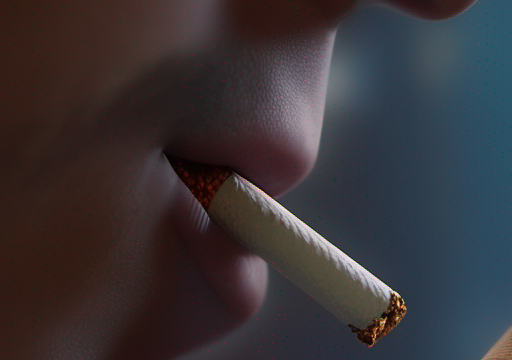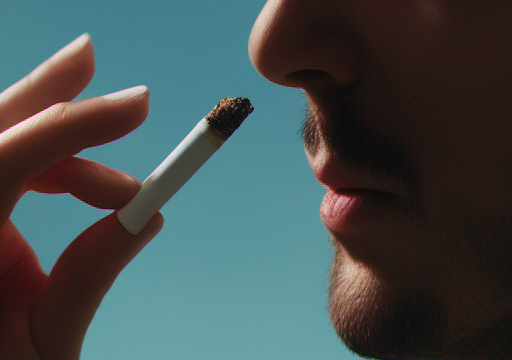🚨 Seriousness of symptom: normal
Hey there! 👋 When it comes to quitting smoking, the first cigarette of the day can be a real challenge. 🚭 It’s common for many smokers to feel a strong desire to light up as soon as they wake up, but it’s important to remember that this is a trigger that can make it harder to quit. 💪
The difficulty of not smoking the first cigarette of the day can vary from person to person, but some common symptoms include:
🤔 Cravings: Strong cravings for a cigarette can hit as soon as you wake up, making it hard to resist the urge to smoke.
😓 Irritability: Feeling grumpy or irritable, especially in the morning, can make it harder to stay on track with your quit plan.
😔 Anxiety: The fear of failing at quitting or the anxiety of dealing with withdrawal symptoms can make it difficult to stay motivated.
😓 Fatigue: Feeling tired or sluggish in the morning can make it harder to muster up the energy to resist the urge to smoke.
😔 Boredom: Having a hard time finding things to do or staying occupied can make it easier to reach for a cigarette out of boredom.
💪 It’s important to remember that these symptoms are normal and temporary, and they will subside with time. 🕰️ In the meantime, there are several strategies you can use to help manage these symptoms and stay on track with your quit plan. 💪
Some tips to help you not smoke the first cigarette of the day include:
🌞 Delaying: Try to delay smoking the first cigarette of the day by 10-15 minutes. This can help reduce cravings and give you time to think about why you’re smoking.
💆♀️ Stretching: Stretching can help reduce stress and anxiety, making it easier to resist the urge to smoke.
💆♂️ Deep breathing: Deep breathing exercises can help calm your mind and body, making it easier to stay on track with your quit plan.
🎨 Creative distraction: Engage in a creative activity, such as drawing or painting, to distract yourself from the urge to smoke.
📚 Reading: Reading a book or article can help take your mind off of smoking and keep you occupied.
💪 Remember, quitting smoking is a journey, and it’s okay to take it one day at a time. 💪 Stay positive, stay motivated, and don’t give up! 💪

Possible Causes – Difficulty not smoking first cigarette of the day
Difficulty not smoking the first cigarette of the day can be a common challenge for many smokers. There are several possible causes of this symptom, including:
🤔 Stress and anxiety: Stress and anxiety can trigger the urge to smoke, making it difficult to resist the temptation, especially in the morning.
🔥 Nicotine withdrawal: Nicotine is a highly addictive substance, and when you stop smoking, your body may go through withdrawal symptoms, such as irritability, anxiety, and cravings.
🚣♀️ Habit formation: Smoking can become a deeply ingrained habit, making it hard to break the routine and resist the urge to smoke first thing in the morning.
💤 Lack of sleep: Poor sleep quality or quantity can increase the desire to smoke, especially in the morning.
🏃♀️ Physical activity: Increased physical activity can boost your mood and energy levels, making it easier to resist the urge to smoke.
🌱 Environmental factors: Exposure to environmental tobacco smoke, passive smoking, or being around smokers can make it difficult to resist the urge to smoke.
📈 Hormonal changes: Hormonal fluctuations, such as those experienced during pregnancy or menopause, can increase nicotine cravings and make it harder to quit smoking.
💊 Medication side effects: Certain medications, such as antidepressants or anti-anxiety drugs, can increase nicotine cravings or make it harder to quit smoking.
📚 Lack of motivation: A lack of motivation or a lack of a clear reason to quit smoking can make it difficult to resist the urge to smoke.
👥 Social influences: Being around smokers or being influenced by social norms can make it harder to resist the urge to smoke.
By understanding these possible causes, you can develop a personalized quit plan that addresses these factors and helps you overcome the challenge of not smoking the first cigarette of the day.

Diagnosis – Difficulty not smoking first cigarette of the day
🤔 Are you finding it tough to resist the urge to smoke that first cigarette of the day? 🚭 Do you often find yourself reaching for a cigarette as soon as you wake up, even though you know you want to quit? 💔 If so, you’re not alone. Many smokers struggle with this particular challenge, and it’s important to understand the underlying reasons why.
💡 To diagnose difficulty not smoking first cigarette of the day, consider the following signs and symptoms:
🤝 Do you feel anxious or stressed as soon as you wake up? 🤯 Are you experiencing cravings for cigarettes as soon as you wake up? 🚨 Do you find yourself making excuses to smoke that first cigarette of the day? 🤔 Are you having trouble staying motivated to quit smoking?
🔍 If you identify with any of these signs and symptoms, it may be worth exploring the underlying reasons why you’re struggling to quit smoking. It could be due to nicotine withdrawal, stress, or even boredom. 😔 Whatever the reason, understanding the root cause of your difficulty can help you develop a more effective quit plan.
🎯 To help you assess your symptoms and develop a personalized quit plan, we recommend using our tool Yesil Health AI. 🤖 This AI-powered platform can help you understand your smoking habits, identify triggers, and develop strategies to overcome them. 💪
💬 So, what are you waiting for? Take control of your quit journey today and say goodbye to those pesky cravings for good! 🚫💨
Remember, quitting smoking is a journey, and it’s okay to take it one day at a time. Don’t be too hard on yourself if you slip up – just get back on track and keep moving forward. 💪🏼 You got this! 🎉

Treatment – Difficulty not smoking first cigarette of the day
Difficulty not smoking first cigarette of the day can be a significant challenge for many smokers. Here are some treatment options and suggestions to help reduce the difficulty:
🤔 Identify your triggers: Take note of the situations, emotions, or people that trigger your desire to smoke. Once you know your triggers, you can develop strategies to avoid or manage them.
🚭 Set small goals: Instead of quitting cold turkey, try setting small goals for yourself, like not smoking for a certain number of hours or days. This can help you gradually reduce your smoking habit.
🏋️♀️ Exercise: Regular exercise can help reduce stress and anxiety, which are common triggers for smoking. Find an activity that you enjoy, and make it a part of your daily routine.
🌱 Practice mindfulness: Mindfulness techniques can help you stay present and focused, reducing the urge to smoke. Try incorporating mindfulness into your daily routine through meditation, deep breathing, or yoga.
🌱 Herbal alternatives: Certain herbs, such as chamomile or passionflower, have been shown to reduce stress and anxiety. You can try drinking herbal tea or taking herbal supplements to help manage your cravings.
📚 Distract yourself: Keep yourself busy with activities like reading, puzzles, or hobbies. This can help distract you from the urge to smoke and reduce the difficulty of not smoking first thing in the morning.
💆♀️ Massage: Massage therapy can help reduce stress and anxiety, which can make it easier to quit smoking. Try incorporating massage into your daily routine or visiting a professional massage therapist.
💪 Stay positive: Remind yourself of the reasons why you want to quit smoking and the benefits of a smoke-free life. Staying positive and motivated can help make the process easier and more manageable.
Remember, quitting smoking is a journey, and it may take time and effort to overcome the difficulty of not smoking first thing in the morning. Be patient with yourself, and don’t be afraid to seek support from friends, family, or a professional counselor. With the right mindset and strategies, you can reduce the difficulty and live a healthier, smoke-free life.

FAQ
🤔 Q: How can I stop smoking my first cigarette of the day? It’s like a ritual!
💔 A: It’s understandable that smoking can be a comforting habit, but it’s important to remember that it’s not worth the negative effects on your health. Try replacing the ritual with a healthier alternative, like a cup of tea or a quick workout.
😔 Q: I’ve tried quitting before, but I always end up giving in to the craving. What can I do differently this time?
💪 A: It’s important to be kind to yourself and not beat yourself up over past attempts. Instead, focus on what you can do differently this time around. Set small, achievable goals for yourself, like not smoking for a certain amount of time each day.
🤝 Q: Can my family and friends help me quit smoking?
👫 A: Yes, having a support system can make a big difference in your journey to quit smoking. Encourage your loved ones to be your accountability partners and to offer encouragement when you need it.
🎯 Q: What are some tips for dealing with cravings?
💪 A: There are a few things you can try to help manage cravings: deep breathing exercises, chewing gum, or engaging in a hobby you enjoy. It’s also important to stay hydrated and get enough sleep.
💔 Q: I’m worried that I’ll gain weight if I quit smoking.
🧖♀️ A: It’s common for people to gain a few pounds after quitting smoking, but it’s important to remember that the long-term benefits of quitting far outweigh any potential weight gain. Focus on eating a healthy, balanced diet and staying active.
🤝 Q: How can I stay motivated to quit smoking?
🔥 A: Find what works best for you! Whether it’s a reward system, a support group, or a personal mantra, it’s important to find what keeps you motivated and focused on your goal.
💔 Q: I’m worried that I’ll feel deprived if I can’t have my morning cigarette.
🌱 A: It’s understandable to feel deprived when you’re trying to quit smoking, but it’s important to remember that the benefits of quitting far outweigh any temporary discomfort. Try replacing your morning cigarette with a healthier alternative, like a cup of tea or a quick workout.
🤝 Q: How can I deal with the emotional aspects of quitting smoking?
💔 A: It’s important to remember that quitting smoking is a journey, and it’s okay to feel emotional along the way. Try journaling or talking to a trusted friend or family member about your feelings.
💪 Q: What are some strategies for dealing with cravings at night?
🕰️ A: Cravings can be especially strong at night, but there are a few things you can try to help manage them: try to stay busy, engage in a relaxing hobby, or use aromatherapy to help calm your mind and body.
🤝 Q: How can I stay on track with my quit smoking journey?
🔥 A: Staying on track with your quit smoking journey can be challenging, but it’s important to remember that you’re not alone. Find a support group, whether in-person or online, and stay connected with your fellow quitters.
Summary
For many smokers, the first cigarette of the day can be the most challenging. The temptation to light up can be overwhelming, especially after a long night of sleep 😴. But did you know that the struggle to quit smoking can have serious consequences for your health? 🤕
According to a study published in the Journal of Nicotine and Tobacco Research, smokers who struggle to quit in the morning are more likely to experience nicotine withdrawal symptoms throughout the day 💥. These symptoms can include irritability, anxiety, and difficulty concentrating 😓.
So, how can you overcome the challenge of not smoking the first cigarette of the day? Here are a few tips: 🤔
1. Set a quit date and stick to it 📅. Having a clear target in mind can help you stay motivated and focused.
2. Use nicotine replacement therapy (NRT) 💉. NRT can help reduce withdrawal symptoms and cravings.
3. Try aromatherapy 🌱. Certain scents, such as lavender and vanilla, can help calm your nerves and reduce cravings.
4. Stay active 🏋️♀️. Engage in physical activities to distract yourself from the urge to smoke.
5. Seek support 🤝. Share your struggles with a friend or family member and ask for their support.
Remember, quitting smoking is a journey, and it’s okay to encounter setbacks along the way 💔. Don’t be too hard on yourself if you slip up – simply acknowledge the mistake and move on 💪. With time and perseverance, you can overcome the challenge of not smoking the first cigarette of the day and live a healthier, smoke-free life 🌱💕.
>
https://www.medicalnewstoday.com/articles/317956
https://www.verywellhealth.com/what-happens-when-you-quit-smoking-7561262
https://www.mayoclinic.org/healthy-lifestyle/quit-smoking/basics/quitsmoking-basics/hlv-20049487




